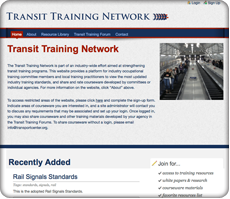News
Dear Friends,
Posted April 2020
Dear Friends,
I would like to acknowledge and applaud all the frontline transit workers who are keeping the nation moving, even in this time of uncertainty and fear. They are working in heavily trafficked areas and are more exposed to the threat of coronavirus than those of us who are able to work from the safety of our homes.
While this crisis continues, it may be hard to focus on the future but that is just what is called for. There is no getting around the fact that reduced ridership has been a result of the pandemic, and this will have long-lasting effects for transit agencies.
As always, times of great challenge can also inspire us to explore new and different ways of doing our work. For the Center, that means looking at how we can best serve our partners and the industry at this critical point in time. Here are our thoughts on what we can do for you, based on our core workforce training mission.
While service is slow, transit agencies can use the time now available to train current workers and to prepare new people to enter the industry. For example, we know that Battery Electric Buses (BEBs) will be a larger portion of most fleets in the near future. We also know that most bus maintenance workers lack the electrical and electronic skills to maintain these buses. Train those workers now.
Transit has a much older workforce than the economy as a whole. In the aftermath of the coronavirus, some, perhaps many, transit workers will retire. Again, training programs, with a particular emphasis on apprenticeship and pre-apprenticeship could help the industry address what have been chronic skills shortages.
While workforce development policies cannot prevent economic downturns, they can make them shorter and less damaging, as well as reduce their longer-term effects. During an economic downturn, proactive workforce development initiatives can keep workers employed, bring them into employment, and increase their productivity and earnings. While workforce development policies cannot prevent economic downturns, they can make them shorter and less damaging, as well as reduce their longer-term effects. During an economic downturn, proactive workforce development initiatives can keep workers employed, bring them into employment, and increase their productivity and earnings. The Organization for Economic Co-operation and Development (OECD) gives a number of recommendations to make labor markets and family incomes more resilient to economic shocks and macroeconomic downturns. Training programs, especially, can be more effective in bad times, as taking part in training activities is less costly than job search activities when there are fewer job opportunities.
Training expenditure in the United States is very low compared to other developed countries. The table on the right shows the ten countries with the highest public expenditure on training and re-employment policies compared to the U.S. effort. Of the 32 developed countries listed, the U.S. ranks 31st. According to the OECD, the United States spent 0.1% of GDP on these activation policies in the same time period. By comparison, Germany, which ranked tenth in OECD’s survey, spent six times as much per capita. This is the perfect time for that to change.

The Center helps in pursuing these policies. Through comprehensive courseware, the creation of registered apprenticeships, and training for trainers, working with the Center can help agencies refocus this period and use it to prepare for a calmer future with a more resilient and better-trained workforce.
We all have our own challenges in responding to this crisis. Because of wise decisions to implement social distancing, a lot of classrooms have been shut down. More training needs to be occurring online and via video. Good training still needs to be interactive and engaging. And when people get back to regular work schedules, on-the-job learning needs to resume. The Transportation Learning Center offers distance learning courses that can be employed in this time of social distancing. We can do more.
The Center looks forward to engaging with our industry partners in this national emergency and beyond as, together, we improve training for the frontline workforce. We welcome your thoughts and inspirations on innovative ways to do this.
If you would like to discuss the possibility of implementing distance-based learning at your location or more broadly - please email Jack Clark
Stay safe and well!
Jack Clark
